De Amerikaanse dichter en schrijver Robert Bly werd geboren op 23 december 1926 in Madison, Minnesota. Zie ook alle tags voor Robert Bly op dit blog.
Prayer for My Father
Your head is still
restless, rolling
east and west.
That body in you
insisting on living
is the old hawk
for whom the world
darkens.
If I am not
with you when you die,
that is just.
It is all right.
That part of you cleaned
my bones more
than once. But I
will meet you
in the young hawk
whom I see
inside both
you and me; he
will guide
you to the Lord of Night,
who will give you
the tenderness
you wanted here.
The Night Abraham Called to the Stars
Do you remember the night Abraham first saw
The stars? He cried to Saturn: “You are my Lord!”
How happy he was! When he saw the Dawn Star,
He cried, “”You are my Lord!” How destroyed he was
When he watched them set. Friends, he is like us:
We take as our Lord the stars that go down.
We are faithful companions to the unfaithful stars.
We are diggers, like badgers; we love to feel
The dirt flying out from behind our back claws.
And no one can convince us that mud is not
Beautiful. It is our badger soul that thinks so.
We are ready to spend the rest of our life
Walking with muddy shoes in the wet fields.
We resemble exiles in the kingdom of the serpent.
We stand in the onion fields looking up at the night.
My heart is a calm potato by day, and a weeping
Abandoned woman by night. Friend, tell me what to do,
Since I am a man in love with the setting stars.
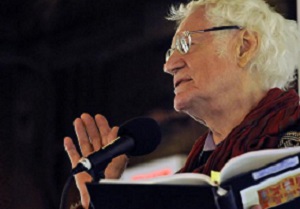
Robert Bly (Madison, 23 december 1926)
De Nederlandse dichter en schrijver Hans Tentije (pseudoniem van Johann Krämer) werd geboren in Beverwijk op 23 december 1944. Zie ook alle tags voor Hans Tentije op dit blog.
Van over zee
Een strijklicht dat zijn schaduwen uitstrekt
naar onbereikbaar geworden, al verwilderde plekken
om wat zich er ooit voltrokken heeft
en misschien nog steeds niet is gewist –
met de wolken wegdrijvende, weer te binnen
geschoten, willekeurige momenten, maar er is zoveel
horizon waarachter ze vervolgens
moeten verdwijnen, terwijl een afgelegen
landschap als dit ze zich zelfs
zou horen te herinneren
als het kijken eindelijk het vergeten inwilligt
zijn alle beelden teruggebracht
tot hun essentie, het onderhuidse waar elk woord, elk lied
immer uit voortgekomen is
in een van over zee, van over duinvalleien
en verstuivingen komend licht, dat alles verheldert
maar niets verklaart
Boedapest – Újpestri Rakpart
Zo’n late namiddag, licht van mist
en druilerig onder de bomen –
haar hand raakt wanneer zij afdaalt naar de rivier
de leuning niet, maar terloops toch
een enkel blad van de zich rond de spijlen
slingerende, welige klimop
misschien neuriet zij ondertussen iets
als ‘Trauriger Sonntag’, dat zigeunerstrijkjes vandaag de dag
dikwijls spelen in restaurants
aan de overkant en ruikt de tamme kastanjes
die gepoft worden in de buurt
van de Margarethabrug naar Pest
stilte omgeeft de lanen, de kaden, alsof het innigste
zich met een waas van verlangen
heeft verweven, met bruidssluier, deze
voile van verlatenheid
en waar het water snel en ongeneeslijk flets voorbijstroomt
treedt zij je tegemoet, maakt haar haren los
en balanceert op één voet dan om een enkelbandje
te verschikken voor zij haar wandeling
voortzet en daarna al gauw opgaat in het wit –
het besmettelijkste wit dat er is
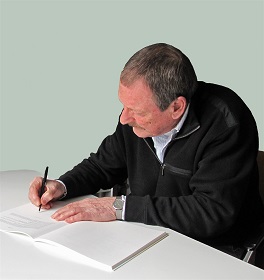
Hans Tentije (Beverwijk, 23 december 1944)
De Nederlandse dichter, schrijver en vertaler Hans Kloos werd geboren in Baarn op 23 december 1960. Zie ook alle tags voor Hans Kloos op dit blog.
Winter 93/94
Er staan een paar mannen
in de sneeuw te hakken
op het betonnen basketbalveldje
van de oude afgesneden wijk.
Geen kind te bekennen, alleen,
als een houweel zich in het zachte
rubber boort, de puffende schil
van een roodbruine basketbal.
Straks laat het nieuws ons
beelden zien van onderuitploffende
dikzakken – leedvermaak
in de sneeuw van Hartford, Connecticut.
Andere mannen scheppen de sneeuw
in groene kruiwagens die weer andere mannen
wegrijden naar een bestemming
buiten het bereik van de camera’s.
Pernilla Wiberg, een Zweedse,
heeft zojuist op het nippertje verloren
bij het onderdeel reuzenslalom
in het Oostenrijkse Kitzbühel.
Wij kijken hier tv,
van het ene kanaal naar het andere
waarop de sneeuw voortruist
binnen het bereik van de camera’s.
In groene kruiwagens smelt langzaam
de rode sneeuw en het bloed van 6 kinderen
getroffen door mortiergranaten
lost op in de smurrie van Sarajevo
– er staan een paar mannen
in de sneeuw te hakken
en de beelden in hun ogen
smelten niet
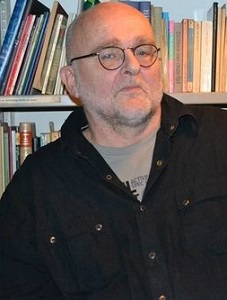
Hans Kloos (Baarn, 23 december 1960)
De Duitse schrijver, literatuurcriticus en redacteur Volker Jehle werd geboren op 23 december 1954 in Balingen. Zie ook alle tags voor Volker Jehle op dit blog.
Uit: Ulrike
„Tomek hätte sich vor Scham am liebsten verkrochen, der alte Mann aber habe nur Augen für die Deutsche gehabt, habe sein Zahnverhau in ein breites Lächeln gezwängt, die Hand auf die Reste des speckigen Unterhemds gepreßt und mit einem Gefühl, dem tiefsten, das er wohl aufbringen konnte, gesagt: „Heimweh“.
Breit grinsend habe er geradebrecht, wie sie nach dem Krieg rings um alle Häuser im Boden gestochert hätten – er habe die Länge der eisernen Stäbe genau angegeben –, die Ausbeute sei mickrig gewesen, Porzellan, vielleicht ein bißchen Zinn.
Wie schön die Gärten hier gewesen seien, welch wunderschöne Häuser man abgerissen und daß man die Allee aus Ebereschen abgehackt habe, um die Straße zu begradigen.
Er sei, man habe ihn kaum verstanden, hier zwangsangesiedelt worden, geboren sei er in der Nähe von Königsberg, im letzten Jahr habe er zum ersten Mal wieder sein Heimatdorf besucht. Wieder habe er seine Hand aufs Herz gepreßt, „Heimweh“ gesagt und sei in seine verlotterte Bruchbude zurückgeschlurft.
Eckart schließt die Augen.
Pause.
Alle Geschichten wiederholen sich. Wenn ich also wolle, werde er die ganze Sache einmal aufrollen, ungeschminkt, was bedeute: auch die eigenen Irrtümer und – teils bösen – Fehler einzuräumen, exemplarisch natürlich, drunter mache er’s nicht.
Da ich demnächst Zivi sei und da Zivis heutzutage offenbar anders seien, könne ihnen – er lächelt hinterhältig – ein leuchtendes Vorbild aus alten Tagen jedenfalls nicht schaden.
Allerdings bestehe er darauf, daß er schon damals nicht war, wie andere waren. Aber das könne er ja mir „zur Beurteilung anheimstellen“, wenn ich wolle. Dann krame er bis morgen abend das alte Zeug hervor.
Er legt die Fingerspitzen gegeneinander.
Pause.
Schätzungsweise sieben Abende müßten wir uns um die Ohren schlagen, dann sei ich getauft und konfirmiert.
Deshalb sollten wir am besten gleich beginnen, denn spätestens nächsten Sonntag – wieder lächelt er auf seine versteckte Art – gedenke er zu ruhen.“
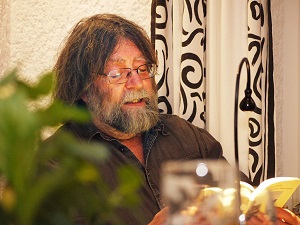
Volker Jehle (Balingen, 23 december 1954)
De Britse schrijver Tim Fountain werd geboren op 23 december 1967 in Dewsbury, West Yorkshire. Zie ook alle tags voor Tim Fountain op dit blog.
Uit: Dandy In The Underworld
« VOICE: (On machine) This is Sebaaaaastian Horsley, please leave me a message after the tone. VOICE: (On machine.) Basti it’s John from Henry Oliver tailoring. You still owe me five thousand pounds. You’re a cunt.
Sebastian emerges at the bedroom door in the half-light. He lounges against the frame in a silk dressing gown. He holds a glass of milk.
SEB: You didn’t need to waste 10p to tell me that dear, I could have called you. He switches on a little light on his desk and picks up a small clock from his desk and holds it up to see it. Golly is that the time? Mind you, sleep has always been like death to me but without the long-term commitment. I once spent seventy-two hours asleep in my old flat in Shepherd Market. I was on Heroin at the time but still it was quite an achievement. I’d just read a book by a man called Ernest Becker who argued that everything we did in life was about distancing ourselves from our own inevitable death and that only if we admitted we were just doomed and defecating creatures could we begin to transcend our plight. So I did a crap in the middle of the room and caked it all over myself. I smeared man on my stomach and pig on the walls and then I put on Beethoven’s Ninth and had a good wank. I can’t say as it changed my outlook on life much, but to this day I can’t buy lavatory paper, I have to send the cleaner out. I sympathise with the Chagga Tribe for whom the height of fashion is a tight fitting anal plug. They proclaim their superiority by pretending to not to need to defecate. It’s tragic that even the Byron’s amongst us have to hunker down like a baboon every morning.
Beat.
Speaking of shit, I better get mine together. I’m having lunch at Claridge’s at one with a girl called Henrietta from my Austrian publishers. She’s as flat chested as a pageboy but there’s something about her that’s eminently fuckable. I tried to get into her knickers last night — I brought her back here after dinner at the Groucho — and we stayed up ’til all hours discussing the lack of meaning of life — but she wasn’t having it. Apparently she’s monogamous and has a boyfriend in the Alps. It’s difficult to decide which of the two facts is the most disturbing isn’t it? Actually it’s not.”
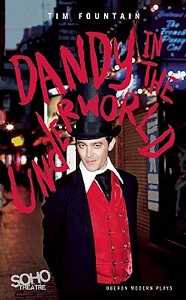
Tim Fountain (Dewsbury, 23 december 1967)
Cover
De Amerikaans schrijfster Donna Tartt werd geboren in Greenwood, Mississippi, op 23 december 1963. Zie ook alle tags voor Donna Tart op dit blog.
Uit:The Secret History
“The snow in the mountains was melting and Bunny had been dead for several weeks before we came to understand the gravity of our situation. He’d been dead for ten days before they found him, you know. It was one of the biggest manhunts in Vermont history—state troopers, the FBI, even an army helicopter; the college closed, the dye factory in Hampden shut down, people coming from New Hampshire, upstate New York, as far away as Boston.
It is difficult to believe that Henry’s modest plan could have worked so well despite these unforeseen events. We hadn’t intended to hide the body where it couldn’t be found. In fact, we hadn’t hidden it at all but had simply left it where it fell in hopes that some luckless passer-by would stumble over it before anyone even noticed he was missing. This was a tale that told itself simply and well: the loose rocks, the body at the bottom of the ravine with a clean break in the neck, and the muddy skidmarks of dug-in heels pointing the way down; a hiking accident, no more, no less, and it might have been left at that, at quiet tears and a small funeral, had it not been for the snow that fell that night; it covered him without a trace, and ten days later, when the thaw finally came, the state troopers and the FBI and the searchers from the town all saw that they had been walking back and forth over his body until the snow above it was packed down like ice.
It is difficult to believe that such an uproar took place over an act for which I was partially responsible, even more difficult to believe I could have walked through it—the cameras, the uniforms, the black crowds sprinkled over Mount Cataract like ants in a sugar bowl—without incurring a blink of suspicion. But walking through it all was one thing; walking away, unfortunately, has proved to be quite another, and though once I thought I had left that ravine forever on an April afternoon long ago, now I am not so sure. Now the searchers have departed, and life has grown quiet around me, I have come to realize that while for years I might have imagined myself to be somewhere else, in reality I have been there all the time: up at the top by the muddy wheel-ruts in the new grass, where the sky is dark over the shivering apple blossoms and the first chill of the snow that will fall that night is already in the air.”
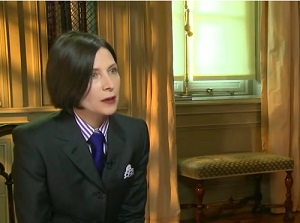
Donna Tartt (Greenwood, 23 december 1963)
De Franse dichter, schrijver en essayist Marcelin Pleynet werd geboren op 23 december 1933 in Lyon. Zie ook alle tags voor Marcelin Pleynet op dit blog.
Dans la lumiere du jour
Je suis claire dit-elle.
Je suis claire comme les rumeurs de l’aube.
Je suis le miroir, je m’efface
— et dans la vallée un matin laiteux pousse des berges de la rivière jusqu’au seuil, jusqu’aux toits des maisons molles de sommeil
— à sa naissance le jour est partagé entre le bonheur de la prairie et la lumière tardive de l’étang
Je suis dit-elle, je suis dans la lumière du jour
Grande hazana!
L’arbre défait ses plis
et le noir de la nuit mange
les yeux d’une lune d’argile
Si la mort pénètre ici dans le cours des eaux la rivière est sans mémoire vers l’éclat gelé de la nuit
image du livre sans feuille où les terres s’assèchent
Là-bas où s’étonne encore l’herbe frileuse
Le feu que je nomme bleuit comme les bois déjà couverts d’encre
Une campagne sans souffle derrière l’aboi des sapins
accueille les dormeurs perdus dans un songe de sang
Plus loin
comme une fumée
l’eau rêve sur la terre défaite
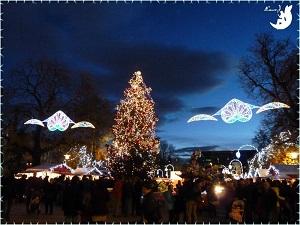
Marcelin Pleynet (Lyon, 23 december 1933)
Marché de Noël de Lyon
De Amerikaanse schrijver Norman Fitzroy Maclean werd geboren op 23 december 1902 in Clarinda, Iowa. Zie ook alle tags voor Norman Maclean op dit blog.
Uit:A River Runs Through It
“Each of us, then, not only thought he was tough, he knew the other one had the same opinion of himself. Paul knew that I had already been foreman of forest-fire crews and that if he worked for me and drank on the job, as he did when he was reporting, I would tell him to go to camp, get his time slip, and keep on down the trail. I knew that there was about as much chance of his fighting fire as of his eating oatmeal.
We held in common one major theory about street fighting—if it looks like a fight is coming, get in the first punch. We both thought that most bastards aren’t so tough as they talk—even bastards who look as well as talk tough. If suddenly they feel a few teeth loose, they will rub their mouths, look at the blood on their hands, and offer to buy a drink for the house. “But even if they still feel like fighting,” as my brother said, “you are one big punch ahead when the fight starts.”
There is just one trouble with this theory—it is only statistically true. Every once in a while you run into some guy who likes to fight as much as you do and is better at it. If you start off by loosening a few of his teeth, he may try to kill you.
Every man sees in his relatives, and especially in his cousins, a series of grotesque caricatures of himself.
I suppose it was inevitable that my brother and I would get into one big fight which also would be the last one. When it came, given our theories about street fighting, it was like the Battle Hymn, terrible and swift. There are parts of it I did not see. I did not see our mother walk between us to try to stop us. She was short and wore glasses and, even with them on, did not have good vision. She had never seen a fight before or had any notion of how bad you can get hurt by becoming mixed up in one. Evidently, she just walked between her sons. The first I saw of her was the gray top of her head, the hair tied in a big knot with a big comb in it, but what was most noticeable was that her head was so close to Paul I couldn’t get a good punch at him. Then I didn’t see her anymore.
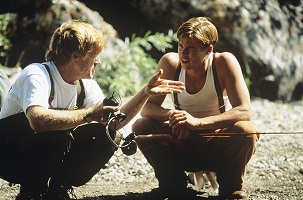
Norman Maclean (23 december 1902 – 2 augustus 1990)
Robert Redford, regisseur van de gelijknamige film uit 1992 en Brad Pitt (Paul)
De Nederlandse dichter-dominee Jan Jakob Lodewijk ten Kate werd geboren op 23 december 1819 in Den Haag. Zie ook alle tags voor J.J.L. ten Kate op dit blog
Voor een berijmd verhaal
Wilt gij een berijmd verhaal?
Neem een Ridder in het staal
En een Jonkvrouw in ’t scharlaken.
Laat hen in een lange smart
Op een ijzren vaderhart
Langzaam trekken tot ze blaken.
Neem een heks of anderhalf
Met een dosis toverzalf
En een paddestoel of veertien.
Smeer ze op Hem en ’t Maagdelijn,
Tot ze broer en zuster zijn,
En malkaêr niet willen weerzien.
Scheid ze dan in tranen af,
Giet een helft op ’t Heilig graf,
De andere in een kloostercelletje.
Laat ze dampen tot een spook;
Dood daarna de vader ook:
En vouw ze om een ulevelletje!
Aan Jantje pedant
Gij,die uzelv’ zo wijs gelooft,
Ei, let eens op die korenschoven!
De volle halm buigt needrig ’t hoofd;
De lege steekt het trots naar boven.
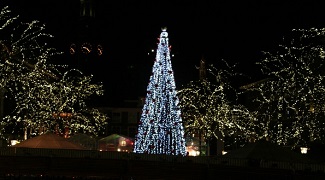
J.J.L. ten Kate (23 december 1819 – 24 december 1889)
Den Haag, de Grote Markt in kerstsfeer
Zie voor nog meer schrijvers van de 23e december ook mijn vorige blog van vandaag.
